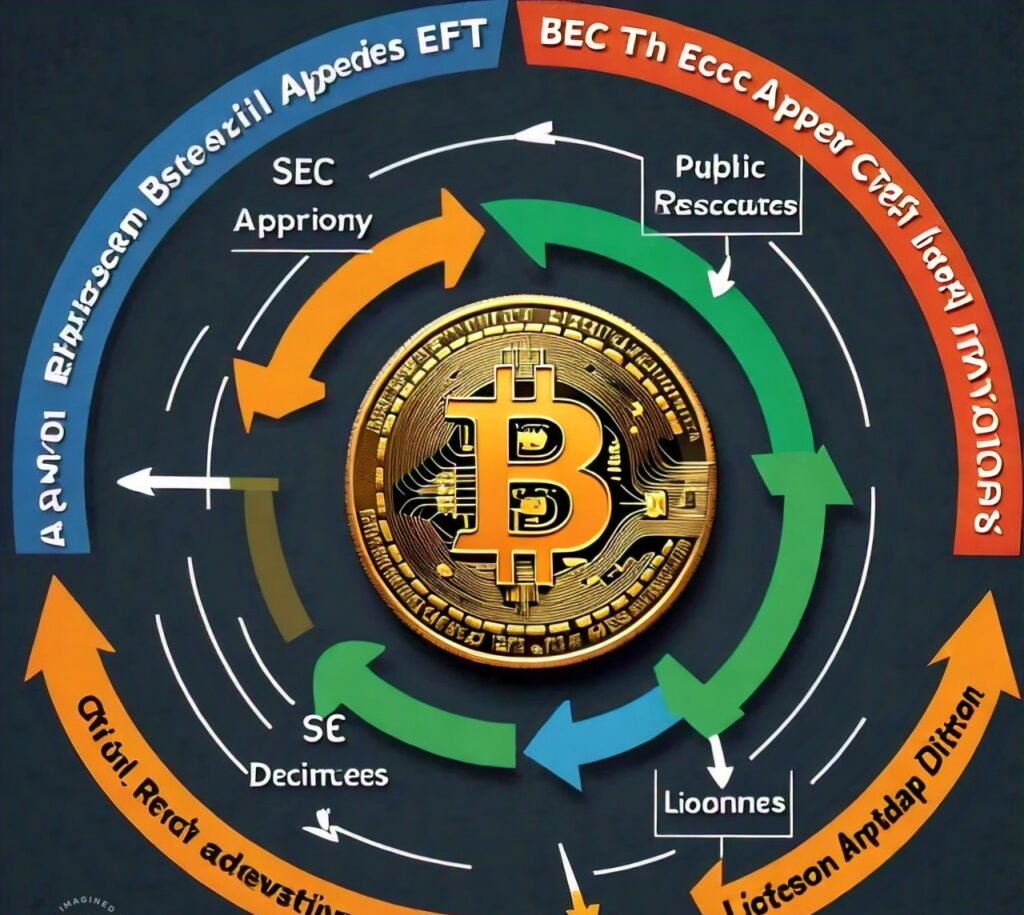Subscription required
Introduction
In recent years, Bitcoin has transformed from a niche digital asset into a mainstream investment vehicle, attracting the attention of both individual and institutional investors. One of the most significant developments in this evolution has been the introduction of Bitcoin Exchange-Traded Funds (ETFs). These financial products offer investors a regulated and accessible way to gain exposure to Bitcoin without the need to directly purchase or store the cryptocurrency.
As Bitcoin ETFs gain traction, understanding their approval status becomes crucial for investors. The approval process for these ETFs involves stringent regulatory scrutiny and can significantly impact market dynamics. With the potential to influence Bitcoin prices, investment strategies, and overall market sentiment, staying informed about which ETFs have been approved, are pending, or have been rejected is essential for making well-informed investment decisions.
This article delves into the current state of Bitcoin ETF approvals, providing a comprehensive overview of the regulatory landscape, approved ETFs, pending applications, and the reasons behind any rejections. By exploring these facets, we aim to equip crypto investors with the knowledge needed to navigate this evolving segment of the cryptocurrency market effectively.
1. What is a Bitcoin ETF?
A Bitcoin Exchange-Traded Fund (ETF) is a type of investment fund that is traded on stock exchanges, much like traditional stocks. It aims to track the price of Bitcoin, providing investors with a way to gain exposure to the cryptocurrency without having to directly purchase or manage the underlying asset. Bitcoin ETFs represent a significant development in the financial industry, merging traditional investment vehicles with the innovative world of cryptocurrencies.
Definition and Purpose
A Bitcoin ETF allows investors to buy shares of the fund, which in turn invests in Bitcoin or Bitcoin futures contracts. The value of these shares is designed to reflect the price movements of Bitcoin. This structure provides several key advantages:
- Accessibility: Bitcoin ETFs offer a convenient way for investors to gain exposure to Bitcoin through traditional brokerage accounts, eliminating the need for direct interaction with cryptocurrency exchanges.
- Liquidity: Being traded on major stock exchanges, Bitcoin ETFs provide high liquidity, making it easier for investors to buy and sell shares compared to the often less liquid cryptocurrency markets.
- Regulation: Bitcoin ETFs are subject to regulatory oversight, which can offer investors an added layer of security and confidence compared to unregulated cryptocurrency exchanges.
How Bitcoin ETFs Work
Bitcoin ETFs generally work by holding Bitcoin or Bitcoin futures contracts. The fund’s value fluctuates in line with the price of Bitcoin, allowing investors to benefit from Bitcoin’s price movements without dealing with the complexities of cryptocurrency storage and security.
- Physical Bitcoin ETFs: These ETFs hold actual Bitcoin in a digital wallet. The value of the ETF shares reflects the price of the Bitcoin held by the fund.
- Futures-based Bitcoin ETFs: These ETFs invest in Bitcoin futures contracts rather than holding Bitcoin directly. The value of these ETFs depends on the performance of the futures contracts, which can differ from the spot price of Bitcoin.
Advantages Over Direct Bitcoin Investments
Investing directly in Bitcoin requires managing private keys, ensuring the security of digital wallets, and navigating cryptocurrency exchanges. Bitcoin ETFs simplify these aspects by offering:
- Ease of Use: Investors can buy and sell Bitcoin ETF shares through regular stock trading platforms without needing to set up cryptocurrency wallets or manage private keys.
- Regulatory Protection: Bitcoin ETFs operate under regulatory frameworks that can offer investors protection against fraud and market manipulation.
2. The Approval Process for Bitcoin ETFs
The approval process for Bitcoin ETFs is a critical aspect that determines which funds are available for investment and under what conditions. Understanding this process helps investors navigate the complexities and anticipate the availability of new Bitcoin ETFs. This section provides an overview of the regulatory approval process, key bodies involved, and common challenges faced by ETF applications.
Overview of the Regulatory Approval Process
The approval of Bitcoin ETFs involves a multi-step process that requires compliance with regulatory standards and detailed scrutiny by financial authorities. The primary steps include:
- Proposal Submission: Fund managers submit a detailed proposal to the regulatory body, outlining the structure, investment strategy, and operational procedures of the Bitcoin ETF. This proposal includes information on how the fund plans to track Bitcoin’s price and manage its assets.
- Review and Evaluation: Regulatory bodies review the proposal to ensure it meets all regulatory requirements. This involves evaluating the fund’s compliance with securities laws, market integrity, and investor protection measures.
- Public Comment Period: In many jurisdictions, the proposal is subjected to a public comment period where stakeholders, including investors and industry experts, can provide feedback or raise concerns.
- Decision and Approval: After reviewing the proposal and addressing any concerns raised during the public comment period, the regulatory body makes a decision. If approved, the ETF is allowed to list on an exchange and become available for trading.
- Ongoing Compliance: Once approved, the Bitcoin ETF must adhere to ongoing regulatory requirements, including periodic reporting and disclosure of fund performance and holdings.

Key Regulatory Bodies Involved
Several regulatory bodies are responsible for overseeing the approval of Bitcoin ETFs, depending on the jurisdiction:
- U.S. Securities and Exchange Commission (SEC): The SEC is the primary regulatory authority for Bitcoin ETFs in the United States. It assesses the proposals based on criteria related to investor protection, market manipulation, and liquidity.
- Financial Conduct Authority (FCA): In the United Kingdom, the FCA oversees the approval and regulation of financial products, including Bitcoin ETFs. The FCA focuses on ensuring that ETFs meet standards for transparency and investor protection.
- Canadian Securities Administrators (CSA): In Canada, the CSA is responsible for regulating Bitcoin ETFs. It reviews applications to ensure compliance with local securities laws and regulations.
Criteria for Approval and Common Hurdles
The approval process for Bitcoin ETFs involves several criteria and challenges that fund managers must address:
- Market Manipulation: Regulators seek to ensure that Bitcoin ETFs are not susceptible to market manipulation. Proposals must demonstrate mechanisms for safeguarding against such risks.
- Liquidity: The ETF must have sufficient liquidity to handle large transactions without causing significant price fluctuations. Regulators assess the fund’s ability to manage liquidity effectively.
- Custody and Security: For physical Bitcoin ETFs, demonstrating secure custody of the underlying Bitcoin is crucial. This includes ensuring that the digital assets are protected against theft and loss.
- Transparency: Regulators require transparency in the ETF’s operations, including clear disclosures about fees, holdings, and investment strategies.
3. Current Status of Bitcoin ETF Approvals
The status of Bitcoin ETF approvals is a key area of interest for investors, as it directly impacts the availability and characteristics of these investment products. This section provides a detailed overview of the current status of Bitcoin ETFs, including those that have been approved, those still pending approval, and those that have been rejected. Understanding these aspects can help investors make informed decisions about their investment strategies.
Approved Bitcoin ETFs
As of the latest updates, several Bitcoin ETFs have been granted approval by regulatory bodies. These ETFs provide investors with an opportunity to gain exposure to Bitcoin through regulated financial products. Here’s a look at some of the prominent approved Bitcoin ETFs:
- ProShares Bitcoin Strategy ETF (BITO): This was the first Bitcoin ETF to be approved by the SEC. It invests in Bitcoin futures contracts rather than physical Bitcoin. The ETF aims to provide investment returns that correspond to the performance of Bitcoin futures.
- Valkyrie Bitcoin Strategy ETF (BTF): Another Bitcoin futures ETF approved by the SEC, focusing on Bitcoin futures contracts to track Bitcoin’s performance.
- Purpose Bitcoin ETF (BTCC): Launched in Canada, this was one of the first physically-backed Bitcoin ETFs. It holds actual Bitcoin in custody and aims to track Bitcoin’s spot price.
- Evolve Bitcoin ETF (EBIT): Also in Canada, this ETF is designed to provide exposure to Bitcoin through direct holdings.
Pending Applications
Several Bitcoin ETF applications are currently under review by regulatory bodies. These pending applications represent potential future investment options for investors. Key points include:
- Grayscale Bitcoin ETF Proposal: Grayscale has submitted proposals for a Bitcoin ETF, seeking to convert its Bitcoin Trust into an ETF. This application is under review by the SEC, with ongoing discussions about regulatory compliance and market impact.
- WisdomTree Bitcoin ETF Proposal: WisdomTree has proposed a Bitcoin ETF that would invest directly in Bitcoin. The proposal is currently being evaluated by regulators.
- Fidelity Bitcoin ETF Proposal: Fidelity’s application for a Bitcoin ETF is in the review process. The proposal seeks to offer investors exposure to Bitcoin through a regulated ETF structure.
Rejected Applications
Several Bitcoin ETF proposals have been rejected by regulatory bodies, primarily due to concerns related to market manipulation, liquidity, and other regulatory requirements. Notable rejections include:
- VanEck Bitcoin ETF Proposal: VanEck’s initial proposal for a Bitcoin ETF was rejected by the SEC due to concerns over market manipulation and the ETF’s ability to ensure investor protection.
- Bitwise Bitcoin ETF Proposal: Bitwise’s application for a Bitcoin ETF was also rejected, with regulatory concerns focusing on market surveillance and investor protection.
4. Impact of Bitcoin ETF Approvals on the Market
The approval of Bitcoin ETFs can have significant implications for the cryptocurrency market, influencing Bitcoin prices, investor sentiment, and overall market dynamics. This section explores the various effects of Bitcoin ETF approvals on the market, providing insights into how these developments impact both short-term and long-term investment strategies.
Effect on Bitcoin Prices
The approval of Bitcoin ETFs can lead to notable changes in Bitcoin prices due to increased market exposure and investor participation. Here’s how ETF approvals can impact Bitcoin’s price:
- Price Surge Post-Approval: Historically, the approval of Bitcoin ETFs has often led to a surge in Bitcoin prices. For example, when the ProShares Bitcoin Strategy ETF (BITO) was approved, Bitcoin saw a significant price increase as investors anticipated greater institutional involvement and market legitimacy.
- Market Anticipation and Speculation: The anticipation of ETF approvals can lead to speculative trading and price volatility. Investors might buy Bitcoin in expectation of future ETF-related price increases, which can cause short-term price spikes.
- Increased Liquidity: Approved ETFs can enhance market liquidity by providing additional channels through which investors can gain exposure to Bitcoin. Increased liquidity generally leads to more stable and efficient markets.

Market Sentiment and Investor Behavior
Bitcoin ETF approvals can influence market sentiment and investor behavior in several ways:
- Enhanced Confidence: The approval of regulated Bitcoin ETFs often boosts investor confidence by providing a structured and compliant investment vehicle. This increased confidence can attract new investors and foster a positive market outlook.
- Institutional Participation: ETFs can facilitate greater institutional participation in the Bitcoin market. Institutional investors, who might be hesitant to invest directly in cryptocurrencies, may be more willing to invest in Bitcoin ETFs due to their regulated nature.
- Retail Investor Access: ETFs provide an accessible way for retail investors to invest in Bitcoin without dealing with the complexities of cryptocurrency exchanges and digital wallets. This increased accessibility can lead to a broader investor base.
Case Studies and Examples
Examining past Bitcoin ETF approvals can provide insights into their impact on the market:
- ProShares Bitcoin Strategy ETF (BITO): Upon its approval, BITO became one of the most widely traded Bitcoin ETFs, leading to a notable increase in Bitcoin’s price and heightened market activity.
- Purpose Bitcoin ETF (BTCC): As one of the first physically-backed Bitcoin ETFs, BTCC’s approval in Canada marked a significant milestone, influencing Bitcoin’s price and signaling growing acceptance of cryptocurrency investment products.
5. Strategic Considerations for Investors
When evaluating Bitcoin ETFs, investors should consider several strategic factors to make informed investment decisions. This section outlines key considerations, including investment opportunities, regulatory risks, and whether to adopt a long-term or short-term approach.
Investment Opportunities
Bitcoin ETFs offer several investment opportunities, each with unique features and benefits:
- Direct Exposure vs. Futures Contracts: Investors can choose between Bitcoin ETFs that offer direct exposure to Bitcoin (physically-backed ETFs) and those that invest in Bitcoin futures contracts. Each type has different implications for performance and risk.
- Evaluating ETF Features: When selecting a Bitcoin ETF, investors should examine key features such as management fees, tracking error (how closely the ETF tracks Bitcoin’s price), and fund liquidity. Lower fees and minimal tracking error are generally favorable.
- Diversification: Some Bitcoin ETFs offer exposure to a basket of cryptocurrencies or related assets. Investors seeking broader diversification within the crypto space might consider such options.
Regulatory Risks
Investing in Bitcoin ETFs involves understanding and managing various regulatory risks:
- Regulatory Changes: The regulatory environment for cryptocurrencies and ETFs is evolving. Changes in regulations could impact the availability, structure, and performance of Bitcoin ETFs. Investors should stay informed about potential regulatory developments that could affect their investments.
- Compliance and Security: Ensuring that the Bitcoin ETF complies with regulatory standards and has robust security measures in place is crucial. For physically-backed ETFs, this includes the security of the underlying Bitcoin holdings.
- Market Manipulation Concerns: Regulators scrutinize Bitcoin ETFs for potential market manipulation. Investors should be aware of how these concerns might affect ETF approval processes and market stability.
Long-term vs. Short-term Investment
Investors must decide whether to adopt a long-term or short-term strategy when investing in Bitcoin ETFs:
- Long-term Investment: Investors with a long-term perspective might view Bitcoin ETFs as a way to gain sustained exposure to Bitcoin’s potential appreciation. This approach involves holding ETF shares over extended periods, benefiting from Bitcoin’s long-term growth trends.
- Short-term Trading: For those looking to capitalize on short-term market movements, Bitcoin ETFs offer liquidity and ease of trading. Short-term strategies might involve reacting to market news, regulatory updates, or price fluctuations.
Risk Management
Effective risk management is essential when investing in Bitcoin ETFs:
- Diversification: Diversifying investments across different asset classes and ETFs can help mitigate risks associated with Bitcoin’s price volatility.
- Position Sizing: Investors should carefully consider the size of their positions in Bitcoin ETFs relative to their overall portfolio to manage exposure and potential losses.
- Monitoring Performance: Regularly reviewing the performance of Bitcoin ETFs and staying updated on market conditions can help investors make timely adjustments to their strategies.
Conclusion
As the market for Bitcoin ETFs continues to develop, investors must stay informed about regulatory changes, market trends, and emerging opportunities. By understanding the approval process, market impacts, and strategic considerations, investors can make well-informed decisions and capitalize on the potential benefits of Bitcoin ETFs.
Bitcoin ETFs represent a bridge between traditional finance and the cryptocurrency market, offering a regulated and accessible way to engage with Bitcoin. Whether considering a long-term investment or exploring short-term trading opportunities, investors should approach Bitcoin ETFs with a clear understanding of their features and market dynamics.
By staying up-to-date with the latest developments and maintaining a strategic perspective, investors can effectively navigate the evolving landscape of Bitcoin ETFs and align their investment strategies with their financial goals.






